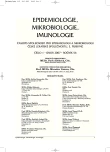-
Medical journals
- Career
Microbial Biofilms in the Food Industr
Authors: J. Schlegelová; S. Karpíšková
Authors‘ workplace: Výzkumný ústav veterinárního lékařství Brno
Published in: Epidemiol. Mikrobiol. Imunol. 56, 2007, č. 1, s. 14-19
Overview
Biofilms are microbial communities whose architecture includes microorganisms, biotic substances produced by these microorganisms and attached organic and inorganic substances from the environment. They pose a serious problem in human medicine. Microbial biofilm communities are also cause for concern in the food industry since pathogenic microorganisms released from the biofilm may contaminate food and raw materials for food production. Not only the microbial community as a whole but also particular cells exhibit increased resistance to sanitation measures and disinfectants which makes it difficult to remove the biofilm or to inactivate particular built up microorganisms. Mainly model studies and molecular genetic and microscopy methods can contribute to better understanding of this issue, and thus to prevention and inactivation of microbial communities on food contact surfaces of equipment in the food production plants. Such studies would be of benefit to both health care and food processing and production.
Key words:
food safety – biocides – eradication of biofilm.
Labels
Hygiene and epidemiology Medical virology Clinical microbiology
Article was published inEpidemiology, Microbiology, Immunology

2007 Issue 1-
All articles in this issue
- Effects of Trace Elements on the Immune System
- Tetanus Immunity in the Elderly in the Czech Republic
- Microbial Biofilms in the Food Industr
- What are the Prospects for Medical Microbiology in the Next 20 Years?
- Notified Cases of Imported Transmisssible Infections in the Czech Republic
- Failures to Comply with the Routine Childhood Immunization Schedule Due to Contraindications and the Use of Alternative Vaccines in Children Aged 0–4 Years in the Czech Republic
- Pancreas Cancer Epidemiology
- Epidemiology, Microbiology, Immunology
- Journal archive
- Current issue
- Online only
- About the journal
Most read in this issue- Pancreas Cancer Epidemiology
- Notified Cases of Imported Transmisssible Infections in the Czech Republic
- Tetanus Immunity in the Elderly in the Czech Republic
- Microbial Biofilms in the Food Industr
Login#ADS_BOTTOM_SCRIPTS#Forgotten passwordEnter the email address that you registered with. We will send you instructions on how to set a new password.
- Career

